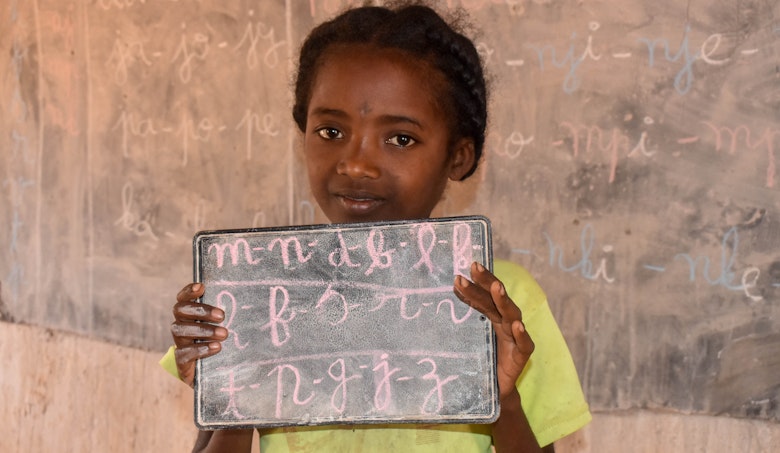"No more mica work. I’m happy to have lunch at school and to study." Mary's story
In the District of Betroka, Anosy Region, specifically in the Fokontany of Tatabe, extreme poverty forces many children to work in the perilous mica mines instead of attending school. For their families to earn a living and survive, especially during the drought season, they are forced to work for long hours in the mica mines every day. Unfortunately, this work takes a toll on their health, deprives them of their rights, and denies them the opportunity to live a normal life.
Mary, a young girl who started working in the mica mines at an early age, experienced hardships and health problems, with no prospect of stepping foot into a classroom. Fortunately, she was selected as a beneficiary of the FAMAHA project. As part of this initiative, she was enrolled in school, equipped with the necessary supplies, and given the chance to improve her life. Now, she is filled with motivation to complete her education and dreams of becoming a nurse.
Life in Tatabe
Eleven-year-old Mary resides in Tatabe, Madagascar, with her mother and four siblings. They live in a 2-room house; one room is designated for sleeping and the other room is designated for cooking. They have no clean water to drink in the village so they would go to fetch water in the Tatabe River which was often contaminated. They can only access the playground in the area that is used by everyone in the village.
Mary lived with her mother after her father abandoned them in search of a better life in the city. Her mother cultivated crops and worked in the mica mines to sustain the family. Unfortunately, with no rains for over 3 years, they could no longer continue to grow crops anymore and resorted to selling their belongings such as cows and chickens for survival. Thereafter in 2020, Mary´s mother decided to venture more into the mining of mica with her children to support her to make ends meet. Sadly, this was still not enough for the entire family. With earnings as low as 0.25 euros per day, they barely had enough food to eat every day.
Sorting Mica for three years
From the age of 7 years, Mary had no choice but to support her mother in sorting mica. She could not go to school. She would also not have enough time to play since she was always working. Life in the mines proved to be unbearable for her, she would often cough due to the pervasive dust. On most occasions, she would eat breakfast, if it was available, eat greens and rice/potatoes for lunch and eat rice/cassava for dinner. Her meals were mostly paid for from the money her mother would borrow from other people, with the hopes of paying it back the next day, once she earns money from sorting mica. ¨Not only was there no school but there was no food either. We were suffering.¨ Mary recalled.
Enrolled in school
Luckily in February 2022, the ALT social worker identified Mary´s family as one of the beneficiaries of the FAMAHA project, a project aimed to eradicate child labour in the mica mines. Mary and her 3 siblings were enrolled in school in June 2022, and provided with school supplies such as copybooks, pens and small boards. Mary was able to have access to lunch in the school canteen and even joined the child rights club in school. Her mother, who was sensitized on children´s rights, is currently receiving training in agriculture, which will hopefully result in better production of greens and cassava during the rainy season. She is happy that the training will boost her agricultural skills.
Better Mica-Free Life
Mary´s life has changed and she is extremely happy now compared to her previous circumstance. She attends school for half-day and eats the lunch (rice with sheep meat, zebu meat, beans or greens) provided in the canteen. Moreover, she now has time to play different games with her friends. After school, she supports her mother with household chores such as washing dishes. Thereafter, she eats dinner and goes to sleep at around 8:00 pm.
Having joined the child rights club, Mary attends sessions on Wednesday afternoons, as well as Saturday and Sunday mornings. Through these gatherings, she has gained a deeper understanding of her rights and takes it upon herself to raise awareness among her peers. She emphasises their rights to go to school, and access food and health services. ¨I am happy to be able to raise awareness amongst my peers. I’m happy to have lunch at school and to study. No more mica work. I’m happy that I’m able to read and write now. ¨she said.
Expressing optimism for her future, May eagerly shared ¨I really hope to get out of misery and hopefully, I’ll be able to finish school. I want to become a midwife/nurse.¨

